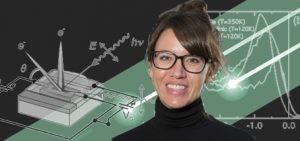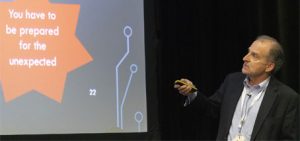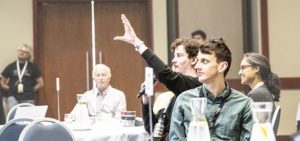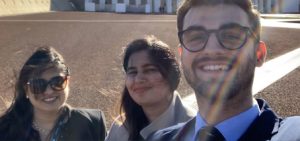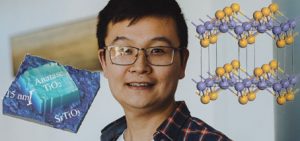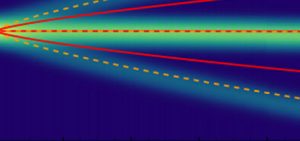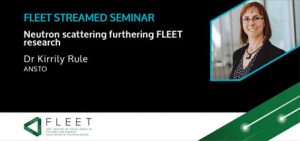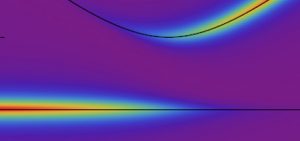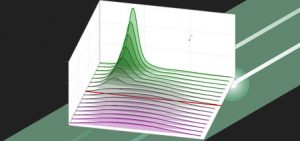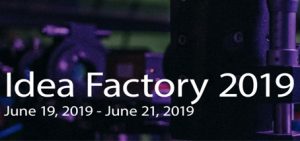FLEET News
It is a great pleasure to announce that Dr Julie Karel (Monash) is now a FLEET Chief Investigator. Dr Karel conducts research at the intersection of materials science and condensed-matter physics, to develop new materials for emerging low-energy nanoelectronic and magnetoelectronic devices. Within FLEET Dr Karel will pursue two research streams: Modification of materials through ionic liquid gating, towards FLEET’s goal …
Working towards the overarching goal of creating pathways to translations of research outcomes, FLEET is building links with partners interested in novel electronic devices and systems. Progress towards this important goal in 2019 includes: Working to include topological transistors in the Institute of Electrical and Electronics Engineers’ (IEEE) International Roadmap for Devices and Systems Lodging two provisional patents Collaborating on …
FLEET ensures that our young researchers are prepared for future success – wherever their career takes them. The Centre currently supports 51 higher degree by research (HDR) students and 43 postdoctoral researchers with another 29 research affiliates working on FLEET projects and invited to Centre training, workshops and events. FLEET connects its researchers with internal and international networks; for example, …
Engaging with politicians and other policymakers is key for any Centre of Excellence, and pitching to politicians is a key skill for researchers, whether they are senior or just starting their career in research. In 2019, three FLEET ECRs were fortunate to attend Science Meets Parliament. Each proved to be remarkably adept at briefing members of the House of Representatives …
FLEET endeavours to lead change within the Australian science community. We believe that all conferences and workshops must work for researchers with families, rather than the other way around. FLEET’s annual workshops are unusual in that families and partners are welcomed to all meals and social events, and free on-site childcare is provided for all delegates. Involving families and children …
An international FLEET collaboration publishing a review of atomically-thin ‘high temperature’ superconductors finds that each has a common driving mechanism: interfaces. The team, including researchers from the University of Wollongong, Monash University and Tsinghua University (Beijing), found that interfaces between materials were the key to superconductivity in all systems examined. The enhancement of superconductivity at interfaces (interface superconductivity enhancement effect) …
Congratulations to FLEET’s Maciej Pieczarka, who has been awarded the START award for young Polish scientists by the Foundation for Polish Science. Dr Pieczarka is an experimental physicist working as a postdoctoral research fellow at the Australian National University in Prof Elena Ostrovskaya’s group. Within FLEET, Maciej studies exciton-polariton condensates, focusing on dynamical condensation and phase transitions of exciton-polariton fluids …
While FLEET’s aim is to reduce the world’s ICT power consumption, we also know that some of the work we do today is having a detrimental effect on tomorrow’s environment. Initiated by FLEET ECRs, the Centre’s Environmental working group is taking a microscope to the environmental impact of FLEET. One early output has been a tool to calculate and compare …
A new theoretical study at Monash University has improved our understanding of the interplay between quantum and thermal fluctuations (or excitations) in quantum matter. The study found that an impurity within a Bose-Einstein condensate (BEC) exhibits an intriguing energy spectrum as its temperature is raised above zero kelvin, with the ground-state quasiparticle splitting into a number of branches that depends …
FLEET Partner Investigator Kirrily Rule (ANSTO) introduced an audience of over 100 to the use of neutron scattering in material analysis last week, in a live-streamed seminar co-hosted with the Australian Institute of Physics. Neutron scattering is a powerful tool for investigating the structure and dynamics of condensed matter systems. In particular the magnetic spin of the neutron can interact …
A Monash-led study develops a new approach to directly observe correlated, many-body states in an exciton-polariton system that go beyond classical theories. The study expands the use of quantum impurity theory, currently of significant interest to the cold-atom physics community, and will trigger future experiments demonstrating many-body quantum correlations of microcavity polaritons. Exploring quantum fluids “Exciton-polaritons provide a playground in …
Australian, public-funded physics centres share a responsibility to engage the Australian community with physics, with the aim of: Increasing the participation of students in science and physics Increasing understanding of and passion for science in the general public Improving the outreach skills of early-career (and senior!) physicists. For example at FLEET (the ARC Centre of Excellence in Future Low-Energy Electronics …
The necessity (and price) of our digital connection An unprecedented number of Australians working from home during the 2020 coronavirus pandemic is a stark reminder of how vital electronic connections have become to community and economy. Computing has transformed society: we use our ubiquitous smartphones to access up-to-date weather predictions, to plot the best route through traffic, and to binge …
A Swinburne University of Technology study published this week examines the propagation of energy as sound waves in a quantum gas, revealing for the first time strong variations in the nature of the sound wave as a function of temperature. At low energies, this energy travels via the collective movement of many particles moving in sync – essentially, as sound …
It’s not easy to convince a group of PhD students and early-career researchers to take three days away from their research to complete a training course. Yet this type of training can provide incredibly valuable skills for these researchers in their future careers and endeavours. At Idea Factory 2019, a joint project with FLEET and the ARC Centre of Excellence …

